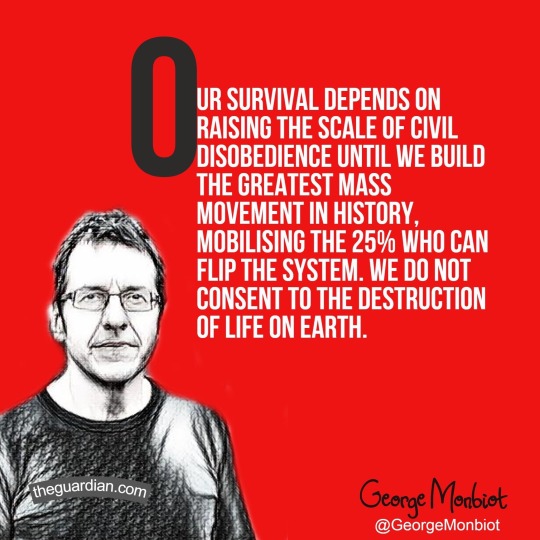#george monbiot
Text
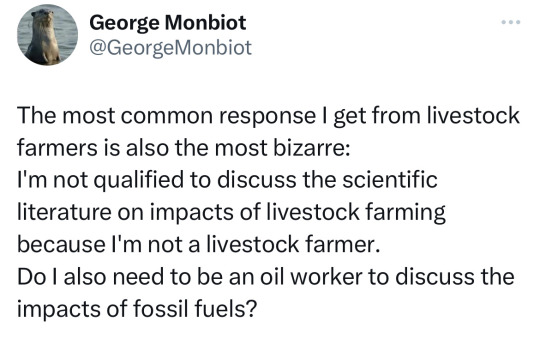
275 notes
·
View notes
Text
In 2014, the Guardian asked me to nominate my hero of the year. To some people’s surprise, I chose Russell Brand. I loved the way he energised young people who had been alienated from politics. I claimed, perhaps hyperbolically, he was “the best thing that has happened to the left in years” (in my defence, there wasn’t, at the time, much competition).
Today, I can scarcely believe it’s the same man. I’ve watched 50 of his recent videos, with growing incredulity. He appears to have switched from challenging injustice to conjuring phantoms. If, as I suspect it might, politics takes a very dark turn in the next few years, it will be partly as a result of people like Brand.
It’s hard to decide which is most dispiriting: the stupidity of some of the theories he recites, or the lack of originality. He repeatedly says he’s not a conspiracy theorist, but, to me, he certainly sounds like one.
In 2014, he was bursting with new ideas and creative ways of presenting them. Today, he wastes his talent on tired and discredited tales: endless iterations of the alleged evils of the World Economic Forum founder, Klaus Schwab, the Great Reset, Bill Gates, Nancy Pelosi, the former US chief medical adviser, Anthony Fauci, Covid vaccines, medical data, the World Health Organization, Pfizer, smart cities and “the globalist masterplan”.
His videos appear to promote “natural immunity” ahead of vaccines, and for a while pushed ivermectin and hydroxychloroquine as treatments for Covid (they aren’t).
He championed the “Freedom Convoy” that occupied Ottawa, which apparently stood proudly against the “tyranny” of Justin Trudeau’s policies. He hawks Graham Hancock’s widely debunked claims about ancient monuments.
A wildly popular clip from one of his videos about the Dutch nitrate crisis offers a classic conspiracy theory mashup: a tangle of claims that may be true in other contexts, random accusations, scapegoating and resonances with some old and very ugly tropes. He claims that “this whole fertiliser situation is a scam”. The real objective is “to bankrupt the farmers so their land can be grabbed”. This “shows you how the Great Reset operates”, using “globalist” regulations to throw farmers off their land. He claims it’s “connected to the land grab of Bill Gates” and the “corruption of companies like Monsanto”.
In reality, the Dutch government was forced to act by a legal ruling, as levels of nitrate pollution, largely from livestock farms, break European law. Its attempts to curb this pollution have nothing to do with the World Economic Forum and its vacuous rhetoric about a “Great Reset”. Or with Bill Gates. Or with Monsanto, which hasn’t existed since 2018 when it was bought by Bayer. So why mention them? Perhaps because these terms have become potent click triggers.
Brand is repeating claims first made by far-right conspiracists, who have piled into this issue, claiming that the nitrate crisis is a pretext to seize land from farmers, in whom, they claim, true Dutch identity is vested, and hand it to asylum seekers and other immigrants. It’s a version of the “great replacement” conspiracy theory, itself a reworking of the Nazis’ blood and soil tropes about protecting the “rooted” and “authentic” people – in whom “racial purity” and “true” German identity was vested – from “cosmopolitan” and “alien” forces (ie Jews). Brand may not realise this, as the language has changed a little – “cosmopolitans” have become “globalists”, “aliens” have become “immigrants” – but the themes have not.
On and drearily on he goes. He manages to confuse the World Health Organization’s call for better pandemic surveillance (by which it means the tracking of infectious diseases) with coercive surveillance of the population, creating “centralised systems of control where you are ultimately a serf”.
Some of his many rants about Bill Gates are illustrated with an image of the man wearing a multicoloured lapel badge, helpfully circled in red. This speaks to another widespread conspiracy theory: those who wear this badge are members of a secret organisation conspiring to control the world (so secret they stick it on their jackets). In reality, it shows support for the UN sustainable development goals.
Such claims are not just wrong. They are wearyingly, boringly wrong. But, to judge by the figures (he has more than 6 million subscribers on YouTube), the audience loves them.
Some of his theories, such as his recent obsession with UFOs, are innocuous enough. Others have potential to do great harm. There’s the risk to the people scapegoated, such as Fauci, Schwab and Pelosi: subjects of conspiracy theories often become targets of violence. There are the risks misleading claims present to public health. And bizarre stories about shadowy “elites” protect real elites from scrutiny and challenge.
While I’m not suggesting this is his purpose, it’s a tactic used deliberately by powerful people to disarm those who might otherwise hold them to account. Donald Trump’s former chief strategist, Steve Bannon, had a term for it: “flood the zone with shit”. As Naomi Klein has shown, the Great Reset conspiracy theory was conceived by a staffer at the Heartland Institute, a US lobby group that has promoted climate denial and other billionaire-friendly positions. It’s a bastardisation of her shock doctrine hypothesis, distracting people from the malfeasance of those with real power.
560 notes
·
View notes
Text
Sourcing food in biotech factories requires a reorganization of the food system to be highly centralized, arranged into corporate-mediated value chains flowing from industrial processing facilities. To my mind that is exactly the corporate industrial food chain model at the root of so many of our current problems. We don’t want the food system concentrated in the hands of less and bigger corporations. Such a concentrated food system is unfair, extractive, easy to monopolize and very vulnerable to external shocks - which we are going to see more of in our unfolding century of crisis. Consider which food system is more likely to fall over in the face of climate catastrophe, dictatorship or cyberattack: - a handful of large electrically dependent food brewers or a distributed network of millions of small farms and local food relationships spread across diverse landscapes?
Which brings us to Chris’s other central premise in ‘Saying No to a Farm-free Future’ - the one that George does attempt a partial response to. Chris argues that the way to organise food to survive in the face of climate crisis is to withdraw away from the corporate controlled industrial agrifood chain and attempt instead to put power back into the distributed local ‘food web’ of small growers, local markets and peasant-type production . This ‘food web’ may sound ‘backwards’ to modernist global north sensibilities of someone like George but it is what still characterizes much of the food systems of the global South. It is also better suited to our times of crisis and challenge. Strengthening food webs is not a “one stop” bold breakthrough. Rather its a distributed social process of ‘muddling through’ together in diverse and different ways that are at best agroecological and collective, culturally and ecologically tailored to different geographies. The food web (or ‘agrarian localism’ as Chris terms it) can’t be summed up in one shiny totemic widget. It doesn’t fit a formulaic “stop this, go that” campaign binary (“stop eating meet , go plant-based”). Leaning into the complexities of local agroecological diverse food webs is maddeningly unsellable as a soundbite.
George presents agrarian localism as a ‘withdrawal’ but its more in the gesture of “staying with the trouble” - a phrase feminist scholar Donna Harraway so brilliantly coined to dismiss big, male, over simplistic technocratic solutionists who claim to have the ‘one big answer’ to our global polycrisis. (sound familiar?). Staying with the trouble and leaning into food webs means embracing a messy politics of relationship, nuance, context, complexity and co-learning. It means a single clever journalist sitting in Oxford can’t dream up a cracking saviour formula all by himself in the space of a 2 year book project. . its why (and how) we build movements - to figure this stuff out collectively. So relax - take off the armour - make friends.
26 notes
·
View notes
Text
We do not deserve this. The billionaire press and the politicians it promotes may deserve each other, but none of us deserves either group. They are constructing a world between them in which we have not elected to live, in which we may not be able to live. On this issue, as on so many, the people tend to be far ahead of those who claim to represent us. But those politicians and media barons deploy every imaginable wile and ruse to prevent decisive action from being taken.
They do so on behalf of the fossil fuel industry, animal farming, finance, construction firms, car manufacturers and airline companies, but also on behalf of something bigger than any of those interests: the power of incumbency. Those who hold power today do so by stamping out challenges, regardless of the form they take. The demand to decarbonise our economies is not just a threat to carbon-intensive industry; it is a threat to the world order that permits powerful men to dominate us. To give ground to climate campaigners is to surrender power.
George Monbiot writing in the Guardian 18/07/22. Full article here
633 notes
·
View notes
Text
In a world built by plutocrats, the powerful are protected while vengeful laws silence their critics
31 notes
·
View notes
Text


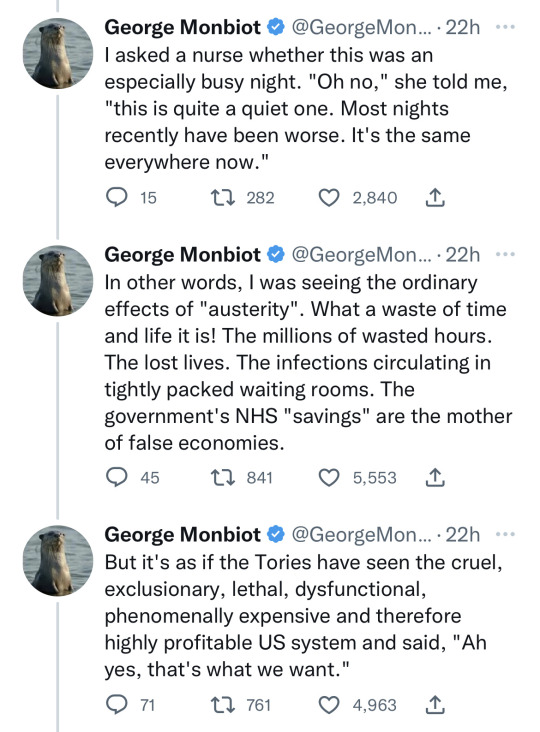

#george monbiot#political twitter#national health service#uk nhs#uk healthcare#conservative party#uk news#uk politics
90 notes
·
View notes
Text
The idea is that by following the basic principles of regen ag – not disturbing the soil, keeping it covered, maintaining living roots, growing a diverse range of crops and the use of grazing animals – they can regenerate tired and depleted soil and produce nutritious food. The work, they argue, is urgent. Up to 40% of the world’s land is now degraded by industrial and harmful farming methods, according to the UN, while a recent study suggested improving soil could keep the world within the 1.5C heating target. ...
The movement has also faced opposition, including from the environmentalist George Monbiot, who last month dismissed the claim that livestock grazing could help mitigate the impact of climate breakdown as “climate science denial”. ...
Barnes Edwards, co-director of the Garlic Farm, which also farms regeneratively, argues that regen ag farmers recognise the “hideously negative impact” of badly managed livestock farming.
But they also argue “it’s the how, not the cow”, and say that cows pooing and trampling in diversely planted fields boosts soil health, micronutrients and attracts insects, birds and butterflies.
“Even if we don’t eat them, cows can have a really helpful role in producing vegetables,” he says.
25 notes
·
View notes
Text
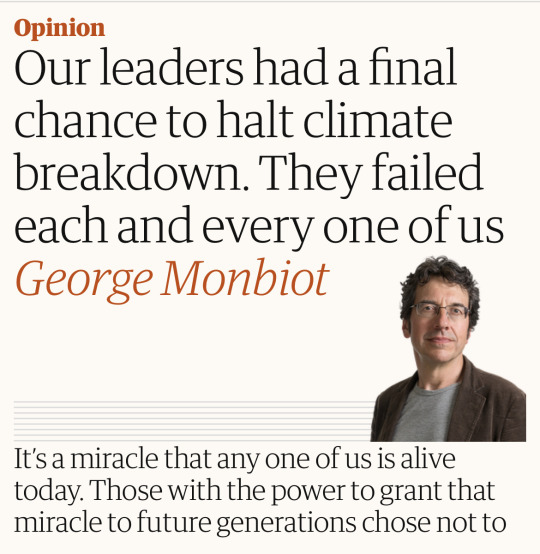
“So here we are, after 50 years of engineered failure, with not one of the 40 markers of climate action on track to meet the targets governments have agreed. In the first nine months of this year, the seven biggest private sector oil companies made around $150bn in profits. Yet governments continue to supplement this loot by granting oil and gas companies $64bn a year in public subsidies. There are no longer any feasible means of preventing more than 1.5C of global heating if new oil and gas fields are developed. Yet fossil-fuel companies, with the encouragement of the governments that either own or license them, are planning a major investment surge between 2023 and 2025. The biggest planned expansions, by a long way, are in the US. The soft facts – the vague and unsecured promises at Sharm el-Sheikh about curbing consumption – count for nothing against the hard facts of extending production.”
63 notes
·
View notes
Text
In 2010, when a high-speed rail line from London to the north – HS2 – was proposed by the outgoing Labour government, I wrote an article arguing that the numbers didn’t add up. The environmental benefits had been inflated by a series of blatant accounting tricks and concocted figures. What the government called the “business case” for the scheme was in fact a cost-benefit analysis, in which the supposed economic benefits had been amplified by outright assaults on common sense. The case for HS2 always was a baggage train of bullshit.
After reading all available documents and finding no justifications for the assumptions the Department for Transport had made, I pressed it for an explanation. After a flurry of panicked phone calls, it eventually told me there was a model for justifying its analysis, but this was “frightfully complicated”. It did not volunteer to send me a copy. The books, it seemed to me, were cooked – thoroughly and fatally.
8 notes
·
View notes
Text
The far right has now become the leading political cause of climate disaster. In the US, the far right and the Republican Party are increasingly one and the same.
A recent paper in the scientific journal Nature identifies the “human climate niche”: the range of temperatures and rainfall within which human societies thrive. We have clustered in the parts of the world with a climate that supports our flourishing, but in many of these places the niche is shrinking. Already, around 600 million people have been stranded in inhospitable conditions by global heating. Current global policies are likely to result in about 2.7C of heating by 2100. On this trajectory, some 2 billion people may be left outside the niche by 2030, and 3.7 billion by 2090. If governments limited heating to their agreed goal of 1.5C, the numbers exposed to extreme heat would be reduced fivefold. But if they abandon their climate policies, this would lead to around 4.4C of heating. In this case, by the end of the century around 5.3 billion people would face conditions that ranged from dangerous to impossible.
As the climate situation grows worse, the far right climate deniers become increasingly shrill and aggressive. Extremists have made climate denial part of culture wars.
Culture war entrepreneurs, often funded by billionaires and commercial enterprises, cast even the most innocent attempts to reduce our impacts as a conspiracy to curtail our freedoms. Everything becomes contested: low-traffic neighbourhoods, 15-minute cities, heat pumps, even induction hobs. You cannot propose even the mildest change without a hundred professionally outraged influencers leaping up to announce: “They’re coming for your ...” It’s becoming ever harder, by design, to discuss crucial issues such as SUVs, meat-eating and aviation calmly and rationally.
Climate science denial, which had almost vanished a few years ago, has now returned with a vengeance. Environmental scientists and campaigners are bombarded with claims that they are stooges, shills, communists, murderers and paedophiles.
Being in a place that's particularly sensitive to climate change does not mean you will automatically end up with more responsible leaders. Case in point: Florida Gov. Ron DeSantis.
In some cases, the cycle plays out in one place. Florida, for example, is one of the US states most prone to climate disaster, especially rising seas and hurricanes. But its governor, Ron DeSantis, is building his bid for the presidency on the back of climate denial. On Fox News, he denounced climate science as “politicisation of the weather”. At home, he has passed a law forcing cities to continue using fossil fuels. He has slashed taxes, including the disaster preparedness sales tax, undermining Florida’s capacity to respond to environmental crises. But the hard right thrives on catastrophe, and again you get the sense that it can scarcely lose.
Tackling climate change internationally reduces the flow of climate refugees in the medium to long term. The GOP solution is to have corrupt contractors build third-rate walls and to dump migrants in the states of political opponents.
If you want to know what one possible future – a future in which this cycle is allowed to accelerate – looks like, think of the treatment of current refugees, amplified by several orders of magnitude.
The international far right thinks refugee-hatred is more politically advantageous to them than mitigating climate change.
Already, the manufactured hatred of refugees has helped the far right to gain or share power in Italy, Sweden and Hungary, and has greatly enhanced its prospects in Spain, Austria, France and even Germany. In every case, we can expect success by this faction to be followed by the curtailment of climate policies, with the result that more people will have no choice but to seek refuge in the diminishing zones in which the human climate niche remains open: often the very nations whose policies have driven them from their homes.
It is easy to whip up fascism. It’s the default result of political ignorance and its exploitation. Containing it is much harder, and never-ending. The two tasks – preventing Earth systems collapse and preventing the rise of the far right – are not divisible. We have no choice but to fight both forces at once.
In the US, 98% of all Democratic candidates are better than 98% of Republican candidates on climate change. There are rare exceptions, and nobody is 100% perfect. But the best way to fight both fascism and climate change is to vote Democratic and not to miss a single election for any level of government.
Biden gets backing of leading environmental groups for re-election
Be A Voter - Vote Save America
#climate change#the far right#fascism#climate deniers#republicans#the gop#culture wars#ron desantis#florida#climate refugees#climate migration#election 2024#register and vote#vote democratic#george monbiot
12 notes
·
View notes
Text

"Si la riqueza fuera el resultado inevitable del trabajo duro y de la empresa, cada mujer en África sería millonaria".
George Monbiot

8 notes
·
View notes
Text
Tempting as it is to turn away, we simply cannot afford to ignore this sector. A remarkably wide and intense range of impacts – from global-scale habitat destruction to the mass slaughter of predators, river pollution, air pollution, dead zones at sea, antibiotic resistance and greenhouse gas emissions – reveal livestock farming, alongside fossil fuels, as one of the two most destructive industries on Earth.
The chances of a reasoned conversation across the divide are approximately zero. That’s not an accident. It’s a result of decades of the meat industry’s tobacco-style tactics and manufactured culture wars. Clever messaging triggers men who are obsessed by (and anxious about) their masculinity, generating paranoia over “feminisation” and a loss of dominance. The industry amplifies popular but false claims about livestock healing the land and drawing down more greenhouse gases than it produces. These efforts are reinforced by a tidal wave of disinformation from far-right influencers on social media. While many people have now become aware of how the fossil fuel industry has deceived us, there’s less recognition of the even grimmer game played by the livestock industry.
This came to a head at Cop28, which was meant to be the first climate summit at which the impacts of the food system were properly considered. But by the time 120 meat and dairy lobbyists had done their worst, nothing meaningful came of it.
72 notes
·
View notes
Link
Behind the causes of food sovereignty and agroecology stands what is arguably the largest social movement in the world. La Via Campesina is an organization of small farmers, founded in 1992 to protest against the World Trade Organization’s incursion into agriculture, which champions social and cultural rights alongside environmental goals. Its members include the Landless Workers Movement in Brazil, the Alliance for Food Sovereignty in Africa and many other local movements. It fights to defend biocultural landscapes against extractive capitals and their captive states. afsa’s members have succeeded in instituting laws combining customary tenure with protection of women and youth rights. Organisations of small farmers like these aim to defend the ecologies and cultures of their territories threatened by corporate power for mines and timber extraction as well as monocultures. Leaders of movements defending land and water are increasingly murdered.
In recent years, La Via Campesina and its allies have won a series of victories at the un and fao, where agroecological principles have been adopted by several committees. The Forest Tenure Funders Group pledged $1.7 billion at cop26 to support indigenous peoples’ tenure rights and forest guardianship. France is now calling for recognition of soils renewed by good farming as carbon sinks, and has pressed the eu to support healthy farming, including agroecology. Naturally, there is the risk of appropriation. ‘Smoke and Mirrors’, a report by the Independent Panel of Experts on Sustainable Food Systems, describes how terms such as ‘nature-based solutions’ and ‘sustainability’ are being used to deflect criticism. Like its fossil allies, agrifood capital is quick to appropriate the language of its critics. The pesticide industry, a leader in spin, today calls itself CropLife.
Monbiot justifies sidelining this global movement on the grounds of low yields. Those who promote agroecology and food sovereignty, he claims, are often ‘yield-blind’, and ‘it’s impossible to feed the world on low-yield agroecology.’ Here and elsewhere, Monbiot relies upon an agronomy whose commitment to modernising agriculture applies narrow measures of efficiency that favour single crops in homogenous fields. Doing so leads him to mismeasure a great deal of what matters to natural systems. The criterion of ‘highest yield on least land’ applies only in fields growing just one crop: yields are much harder to measure in mixed cropping systems, especially those integrated into the dynamics of specific forest, wetland or grassland ecosystems. Monbiot half-acknowledges that ‘sometimes yields from agroecology are higher than from conventional farming’ if everything is counted, and briefly mentions successes in India and Malawi. But to follow this through would undermine his wider prescriptions.
74 notes
·
View notes
Text
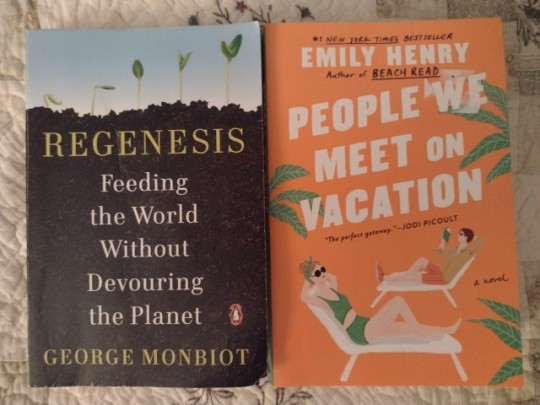
Book reviews: Regenesis: Feeding the World Without Devouring the Planet by George Monbiot and People We Meet on Vacation by Emily Henry
Regenesis was excellent and gave me a lot of ideas; I'm not going to go into too much detail about it only because I already posted a bunch of excerpts from it. But basically, it explains the food related crisis that we are in due to the human population increasing but most of the food being grown being given to livestock. In order free up land to feed the world and reduce the carbon footprint of agriculture, people need to study the microbiomes of soils to see how symbiotic relationships with microbes can reduce plants' need for fertilizers, globally shift to a more plant based diet, plant perennial grains rather than annual ones to reduce weed pressure and the need for tilling, and invest in microbial fermentation as a meat substitute instead of lab grown meat because its cheaper to produce and has a much lower carbon footprint.
.............................................................................................................................
People We Meet on Vacation is about a young woman named Poppy and Alex, her best friend since college. Poppy lives in NY and Alex stayed in their home state of Ohio. Every summer, they go on vacation together. Their vacations used to be cheap budget trips, but ever since Poppy got hired as a writer by a travel magazine called Rest and Relaxation, they could afford to go to really nice places on the magazine's dime. However, on their last trip to Croatia something happened that cause them not to speak for 2 years. Realizing that she hasn't been happy since then, Poppy reaches out to Alex and invites him to go on another vacation, just like old times. He accepts. Lo and behold, during that vacation they realize that they are in love with each other.
The main characters actually had a nice friendship/relationship, but I found this book to be a bit boring and predictable. It wasn't just the ending where the characters realized they should be together; it was also the stereotypical places they traveled to and lack of detailed settings.
#regenesis: feeding the world without devouring the planet#people we meet on vacation#george monbiot#emily henry#books#bookblr#book reviews
11 notes
·
View notes
Text
Excerpt:
A win for bullies is a loss for everyone else: their success is a zero-sum game. Or negative-sum: The first study I mentioned also found that school bullies are more likely to abuse alcohol, smoke, break the law, and suffer mental health problems in later life. But the bullies’ triumph is also an outcome of the dominant narrative of our times: For the past 45 years, neoliberalism has characterised human life as a struggle that some must win and others must lose. Only through competition, in this quasi-Calvinist religion, can we discern who the worthy and unworthy might be. The competition, of course, is always rigged. The point of neoliberalism is to provide justifications for an unequal and coercive society, a society where bullies rule.
Read more.
2 notes
·
View notes
